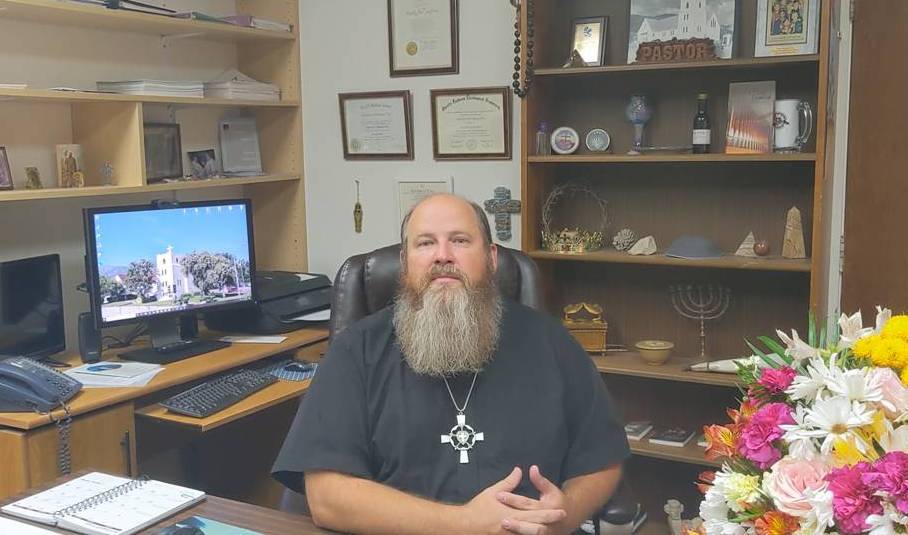This year, St. Valentine’s Day falls on Ash Wednesday. So in 2024, we essentially have an annual celebration of love wrapped up together with an annual commemoration of mortality. Consequently, this strange juxtaposition of the romance of Valentine’s Day with the solemnity of Ash Wednesday highlights the fact that this world is often a mixed bag of the joyous and the sorrowful, the wholesome and the broken. In fact, we’ve seen this mixed-bag reality on stark display within current events, both nationally and internationally. Moreover, the Bible readings for our Sunday worship services recently have been focused on Jesus’ spiritual warfare against evil spiritual forces. Therefore, we’re reminded by everything I just mentioned above that our world’s physical conflicts, both locally and globally, are actually reflections of immense spiritual conflicts.
Throughout the Four Gospels of the New Testament, we see our Lord Jesus on the march against the demonic forces that oppress and bedevil humanity. From town to town, and from synagogue to synagogue, we see Jesus in the Gospels continually on the move to cast out demons and bring us healing. And it’s not insignificant that Jesus often used the setting of a synagogue as the arena of his spiritual combat. For even the meaning of the word synagogue has something to say about this.
Although the word synagogue describes a Jewish congregation of faith, it’s actually a word of Greek origin due to the widespread Greco-Roman influence on the ancient Mediterranean world. So, synagogue literally means “together bring” or “together gather.” And this is like other such words with the “syn“ prefix: words like synthesis (meaning “together stated” or “together put forth”) and synod (meaning “together path” or “together journey”). So, over and over in the New Testament, we see Jesus moving ever onward to synagogue with us (to “gather together” with us) and to synod with us (to “journey together” with us) in order to engage with the demonic forces of the spiritual realm, and to heal us with the good news of mercy and redemptive love freely granted to us in faith by his sacrificial death and resurrection life.
Furthermore, Jesus does this healing and restoring of our souls through three principle ways: 1) through his teachings, 2) through his forgiveness, and 3) through his rebuking of evil spiritual forces. That is, Jesus synagogues with us and synods with us in order to provide us with the deep personal healing of his Divine Guidance (his teachings), of his Divine Absolution (his forgiveness of sins), and of his Divine Authority (his absolute sovereignty over all spiritual powers). So just as Yahweh-God in the Old Testament rebuked the waves of the Red Sea to lead the Israelites into freedom, our Lord Jesus Christ also rebukes the demonic disorder and chaos of our world in order to restore us to the right-guidance and wholeness of God’s goodness. For example, when Jesus was confronted with someone who had an impure spirit in Mark 1, he immediately silenced this corrupt spirit and cast it out. And he did so with no magical incantation; no wizarding spell or potion; no sorcerer’s abracadabra. It’s simply because of his Divine Authority as the Son of God through his Word of Command.
Dear brothers and sisters in Christ, we all know that the year ahead is going to be a conflicted one because of a very contentious US Presidential election and a very unstable global system. But as Christians, we also know that all of these things are physical manifestations of the much larger spiritual warfare that is being fought. Yet we have a Commander and Champion who has absolute authority, always provoking and exposing any and all unclean spirits that vie for our hearts and minds — any and all impure philosophies or theologies or spiritualities we might have.
Our Lord and Savior, Jesus Christ, constantly challenges any and all bad ideologies so that we might be healed from these demonic spirits. For Jesus wants us to be rightly-guided by the good order and original blessing that God intended for us and his whole creation from the very beginning of it all. He wants us to synagogue together and to synod together (“gather together” and “journey together”) according to his Word, knowing that whenever we begin speaking and sharing Jesus’ good news of his grace and truth to seek and save the lost ones of our world then that’s when the unclean spirits can be provoked and stirred-up. But our Lord Jesus Christ himself commands these unclean spirits to “Be silent!” and to “Come out!” By the Divine Authority of his Holy Word and the Divine Power of his Holy Spirit, our Lord Jesus frees us from the disorder and chaos of the various demonic forces we encounter within this fallen and sinful world, and he restores us by his grace (over and over again) unto his original blessing — unto the good order, wholeness and true fulfillment of God’s uncorrupted intention for his creation.
Together in Christ, Pastor Tim

